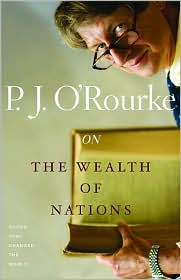
This book is part of the "Books That Changed the World" series published by Atlantic; other titles so far given the same treatment (by different authors) include Darwin's The Origin of Species, Marx's Das Kapital, and the Quran, and more are planned for Thomas Paine's The Rights of Man, Clausewitz' On War, the Bible, and others. It's an interesting series, and let's go ahead and admit right now that we're not going to read any of these books cover-to-cover in our lifetimes, at least not likely. (Exceptions are made for the Bible and the Quran for people adhering to the relevant faiths, although I'll wager many a Christian goes to his grave never having made it through Isaiah or 2 Chronicles.) On that truth rests the basis for this series (a series that, when I described it to Smittywife, prompted the response, "Who's doing War and Peace," a fair question and one that I wonder whether Atlantic has considered). I have a modest review after the jump.
I actually do own Adam Smith's An Inquiry into the Nature and Causes of the Wealth of Nations, and I even brought it with me on a deployment once on the theory that there is so much downtime on deployments that I might actually read the thing. There is a lot of downtime, but there are a dozen easier ways to kill it than with 900 pages of 18th Century philosophy. Since I haven't read it, P.J. read it for me. I should send a thank you note.
So... do I review this book, or the book that this book is about? Tough to say. The book itself is a quick read, surprisingly light considering the weight of its subject. O'Rourke, I hate to say it, may not have been the best choice for this particular review because he comes to the table with, shall we say, some pretty strong political and economic ideas of his own; he did write a book called Eat the Rich, after all. But sometimes having a slightly biased reviewer is good, as P.J. is willing to recognize when Adam Smith had a failure of imagination (or of wisdom), something which happens to most philosophers.
I could happily sit and discuss some of Smith's precepts, and perhaps I shall, but in another post. This is a book review, and I must say that this is a book that you probably should read, and which thankfully you will also enjoy. Not many things are like that. I know you're not going to read The Wealth of Nations, and you know it, too. But it is a very important work, and rests at the foundation of our entire society. And it is deeply misunderstood, too--just for starters, the whole "invisible hand" thing, Smith himself used the phrase only twice and one of those was sarcasm. But you have to dig into the 900-page tome to figure that out. And who has the time? P.J. was getting paid to read the thing, at least, and his discussion of it is readable, intelligent, and sometimes even fun. Heck, certainly you can devote a couple of weeks' reading time to one of the most important works in modern philosophy, right? I recommend it.
No comments:
Post a Comment